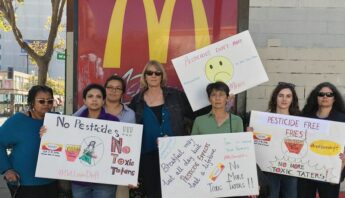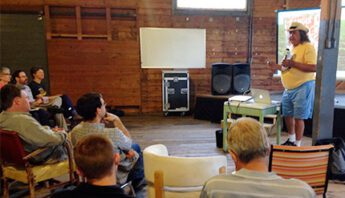Toxic Taters disappointed at missed opportunity to share their stories with nation’s largest potato purchaser
For Immediate Release: May 21, 2015
Contact: Amy Mondloch, Toxic Taters Coalition, tatercoordinator@gmail.com, 218.850.3629
Lex Horan, Pesticide Action Network, lex@panna.org, 651.245.1733
OAK BROOK, IL – After preparing for weeks to bring their concerns about potato pesticides to McDonald’s (NYSE:MCD), residents of rural Minnesota were denied entrance to the company’s annual shareholder meeting. Kathy Connell, Larry Heitkamp, and Amy Mondloch of the Toxic Taters Coalition had worked with a McDonald’s shareholder who provided them with proxies to enter the meeting, but McDonald’s security turned them away as they pulled into the company’s Oak Brook campus.
“I’m doubly disappointed – at McDonald’s failure to meet its 2009 commitment to cut potato pesticides, and at its unwillingness to listen to us today,” said Larry Heitkamp, an organic potato farmer from northern Minnesota. “Right now, McDonald’s potatoes are grown with pesticides including carcinogens, endocrine-disruptors and neurotoxins. I came to McDonald’s to share stories of conventional potato farmers who have begun to transition to farming that enhances the entire system and creates nutrient-dense, healthy food. I’m angry that McDonald’s is stifling the possibility for positive change, instead of making the first steps towards more sustainable farming.”
Kathy Connell, a family farmer from northern Minnesota, said, “When potato fields are planted next to our farm, after the forest is clearcut, our air won’t be safe because they’ll be spraying pesticides once a week all summer. Our well water will soon be too contaminated to drink. I’m disappointed that I came all the way to Chicago to share my experiences with McDonald’s executives—the very people who have the power to influence what happens in the fields next to my home—and wasn’t allowed to speak. When I feel my voice can’t be heard it makes me want to speak louder—even shout!”
Potatoes are a pesticide-intensive crop. In the Minnesota regions where potatoes are grown for McDonald’s “world famous fries,” local residents report that pesticides are applied as often as every 5-7 days. As the country’s largest potato purchaser, McDonald’s exerts a great deal of influence in the U.S. potato market. McDonald’s buys many of its potatoes from RD Offutt Company (RDO), the world’s largest potato grower and the company behind Minnesota’s problematic potato production.
In the past year, McDonald’s market share has continued to slip due to an increasingly crowded fast food market and growing pressures from workers, parents, and health professionals. Under pressure from multiple frustrated groups, the corporation is turning to promises of sustainability to salvage its brand. But by failing to follow through on a 2009 promise to cut potato pesticides, McDonald’s has missed an opportunity to build real credibility on sustainability promises. Though the company has conducted a non-binding survey of its potato growers and released minimal information from the audit, McDonald’s has failed to demonstrate real reductions in pesticide use or share key information about pesticide use.
Today’s trip to the shareholder meeting marked the next step in Toxic Taters’ escalating campaign to ensure that McDonald’s takes meaningful action to cut pesticide use in potatoes. In May 2014, the coalition sent 20,000 petition signatures to McDonald’s shareholders at the company’s AGM. In October 2014, Toxic Taters coordinated actions at 16 McDonald’s stores across Minnesota and flooded McDonald’s with phone calls and emails.
“It’s disturbing that we traveled hundreds of miles to share a message and McDonald’s wasn’t willing to hear it,” said Amy Mondloch, coordinator of the Toxic Taters Coalition. “Our message is simple: we want McDonald’s to tell its growers to release information on what chemicals are being put on the potato fields. Get their growers to cut pesticide use. Fund a study of the ecological and human health effects in the potato growing regions. Most importantly, get their growers to adopt sustainable agriculture practices. When McDonald’s denied our entry today, they simple built our commitment to keep the pressure on.”
###
The Toxic Taters campaign is a joint effort of the Toxic Taters Coalition, Pesticide Action Network, and an array of indigenous, family farm, environmental, and student organizations including the White Earth Land Recovery Project, Land Stewardship Project, Food and Water Watch, Real Food Challenge, and others. More information about the campaign is available at toxictaters.org.







